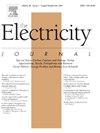基于多智能体强化学习的电池模块多电平逆变器分散控制器
Q1 Social Sciences
引用次数: 0
摘要
基于电池的多电平逆变器越来越受欢迎,因为它能够提高系统的安全性,同时增加有效电池寿命。然而,由大量开关引起的系统的高度自由度也带来了困难。在过去,需要在每个单元上的主模块和从模块之间进行广泛通信的中央计算系统被认为是运行这种系统的解决方案。然而,由于大量的奴隶,总线系统在运行过程中产生了瓶颈。作为传统多电平逆变器系统的一种替代方案,分散控制器为通信容量限制提供了一种可行的解决方案。这些控制器根据当地的测量和决策自主运行。通过这种方法,可以将母线系统上的负载减少约90%,并使整个系统的电荷达到平衡状态,绝对最大标准偏差为1.1×10−5。该策略使多电平逆变器系统更加可靠和通用,同时减少了母线系统的负载,实现了更精确的开关指令。本文章由计算机程序翻译,如有差异,请以英文原文为准。
Multi-Agent Reinforcement Learning-Based Decentralized Controller for Battery Modular Multilevel Inverter Systems
The battery-based multilevel inverter has grown in popularity due to its ability to boost a system’s safety while increasing the effective battery life. Nevertheless, the system’s high degree of freedom, induced by a large number of switches, provides difficulties. In the past, central computation systems that needed extensive communication between the master and the slave module on each cell were presented as a solution for running such a system. However, because of the enormous number of slaves, the bus system created a bottleneck during operation. As an alternative to conventional multilevel inverter systems, which rely on a master–slave architecture for communication, decentralized controllers represent a feasible solution for communication capacity constraints. These controllers operate autonomously, depending on local measurements and decision-making. With this approach, it is possible to reduce the load on the bus system by approximately 90 percent and to enable a balanced state of charge throughout the system with an absolute maximum standard deviation of 1.1×10−5. This strategy results in a more reliable and versatile multilevel inverter system, while the load on the bus system is reduced and more precise switching instructions are enabled.
求助全文
通过发布文献求助,成功后即可免费获取论文全文。
去求助
来源期刊

Electricity Journal
Business, Management and Accounting-Business and International Management
CiteScore
5.80
自引率
0.00%
发文量
95
审稿时长
31 days
期刊介绍:
The Electricity Journal is the leading journal in electric power policy. The journal deals primarily with fuel diversity and the energy mix needed for optimal energy market performance, and therefore covers the full spectrum of energy, from coal, nuclear, natural gas and oil, to renewable energy sources including hydro, solar, geothermal and wind power. Recently, the journal has been publishing in emerging areas including energy storage, microgrid strategies, dynamic pricing, cyber security, climate change, cap and trade, distributed generation, net metering, transmission and generation market dynamics. The Electricity Journal aims to bring together the most thoughtful and influential thinkers globally from across industry, practitioners, government, policymakers and academia. The Editorial Advisory Board is comprised of electric industry thought leaders who have served as regulators, consultants, litigators, and market advocates. Their collective experience helps ensure that the most relevant and thought-provoking issues are presented to our readers, and helps navigate the emerging shape and design of the electricity/energy industry.
 求助内容:
求助内容: 应助结果提醒方式:
应助结果提醒方式:


